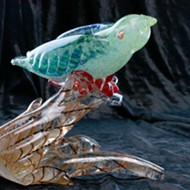Tangled leaves
At the Little Theatre, the lovely House of Blue Leaves is a marriage of unwilling genres
By Anna Weltner[{
"name": "Ad - Medium Rectangle CC01 - 300x250",
"id": "AdMediumRectangleCC01300x250",
"class": "inlineCenter",
"insertPoint": "8",
"component": "2963441",
"requiredCountToDisplay": "12"
},{
"name": "Ad - Medium Rectangle LC01 - 300x250",
"id": "AdMediumRectangleCC01300x250",
"class": "inlineCenter",
"insertPoint": "18",
"component": "2963441",
"requiredCountToDisplay": "22"
},{
"name": "Ad - Medium Rectangle LC09 - 300x250",
"id": "AdMediumRectangleLC09300x250",
"class": "inlineCenter",
"insertPoint": "28",
"component": "3252660",
"requiredCountToDisplay": "32"
}]
It’s hard to say what exactly The House of Blue Leaves is “about.” It’s sort of a black comedy about schizophrenia, extramarital affairs, and delusional aspirations, with some Catholicism thrown in.
Directed by Jill Turnbow and staged at the San Luis Obispo Little Theatre, House of Blue Leaves takes place entirely in the unkempt Queens apartment of Artie Schaugnessy (played by David Norum), a zookeeper and amateur singer-songwriter. It’s the fall of 1965, and today is the day the Pope will arrive in New York. This information is of little interest to Artie, but is crucial to his endearingly trampy new girlfriend Bunny Flingus, who lives downstairs. (What? That’s her name.) So when Bunny, played by Patty Thayer, bursts into Artie’s apartment just before daybreak—a vision in garish polka dots, a dash of faux fur, enormous swaths of blue eye shadow, and a coiffure that appears to be scared stiff—he is understandably taken aback. Bunny, determined to get the Pope’s blessing as he passes through the streets, gradually coerces Artie from his sleeping bag on the couch.
As the two noisily move around the apartment, Bunny yawing in her abrasive New York accent, red stilettos clonking across the hardwood floor, a figure in a bathrobe, disheveled from sleep, emerges from a bedroom, watching the commotion with a look of befuddled contempt. It’s Artie’s wife.
Suzy Newman’s turn as Bananas Schaugnessy—for we never do find out her real name—is worth the price of admission alone. She is a sullen child one moment, a crafty, teasing coquette another, then broken and miserable, her voice breaking under the weight of the world. Newman’s Bananas is a pour soul twisting in pain at the bottom of her own lonely hell.
But rather than elicit sympathy, Bananas’ schizophrenia seems only to exasperate the other characters. Bunny feels free to snap at her as if she were a badly behaving dog, and admits to the audience that she wishes she were dead. Artie cruelly tells Bananas of a dream he had in which their son Ronnie became the Pope, but then rejected his mother—pressing on with the story despite his wife’s tears.
But Artie is too excited over his future with Bunny to worry too much about Bananas, his past. He and his new girlfriend have plans to move to California with his old friend Billy Einhorn (Bob Larson), a successful movie director. And he’s arranged for Bananas to be sent to the mental institution for which the play is named.
Then the play turns senseless and farcical. A gaggle of nuns shows up on the roof, clamoring to be let in through the window. Having tried to climb high enough to see the Pope, they have resigned themselves to watching His Holiness on Artie’s black-and-white TV. Actress Corinna Stroller (Alicia Klein), Billy’s girlfriend, turns up, brandishing tickets to the Pope’s mass at Yankee Stadium, which the nuns immediately begin fighting over, chasing each other around the house. Something happens to Corinna’s hearing aid, leaving her to guess at what others are saying, yelling non-sequiters in reply. The loony bin shows up for Bananas, but puts Bunny in a straightjacket by mistake, and on and on. People run in circles, having zany misunderstandings. It’s funny but jarring, and doesn’t quite work with the more somber mood of the rest of play. It’s great to incorporate moments of humor into a play dealing with heavy issues, but a farce?
The thing about farces is that they never happen in real life. And having spent the first act becoming emotionally invested in the very real dramas of three characters (overlooking the fact that one of them has a name that sounds very much like cunnilingus), audiences may be disappointed to see those stories momentarily shoved aside to make way for this nonsense parade. It’s as if John Guare’s script itself has become schizophrenic.
Personally, I would have happily traded that silliness for a closer look into the character of the Schaugnessys’ son Ronnie (a volatile John Carroll), who goes AWOL from the army, shows up, delivers a heartrending monologue about his childhood, and then starts making threats on the Pope’s life that nobody seems to take seriously. Um, what?
The play mostly regains its footing when tragedy strikes, bringing back the slower pacing, gloomy mood, and bittersweet humor we had grown accustomed to. Once again we see in Arthur a bone yard of dead dreams, in his wife the frightening, surreal forest of mental illness. Despite its flaws, House of Blue Leaves is a lovely oddity of a play. The dialogue is surprisingly poetic; the acting a joy.
I want so badly to tell you about the ending. It’s beautiful, horrible, romantic, and cathartic at once; Artie and his wife seeming, for one frozen moment, to understand and feel compassion for one another. It doesn’t last long, but it’s been on my mind ever since.
Arts Editor Anna Weltner overlooks suggestive names every day. Contact her at [email protected].











